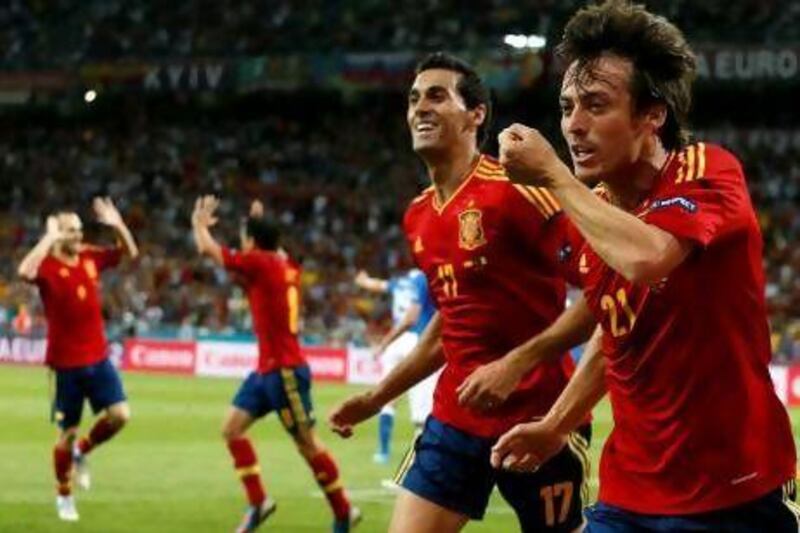It is more than half a century since football displaced bullfighting as Spain's most popular sport.
In the intervening period, La Roja have come to resemble the matadors, displaying guile and skill in the face of more forceful, physical opponents.
And yet their speedy, sublime and successful march into history suggested that there had been a role reversal. Criticism seemed a red rag to his particular bull.
The doubters had grown in volume, the sceptics in size. Italy were starting to win the neutrals' vote. Spain were too predictable.
It was an argument that was defeated just as swiftly as the Italian defence was pierced.
The champions made a statement, lifting silverware on a golden night. Their crown was retained, their right to it reasserted.
Spain were reunited with their style as the made an indelible mark in the record books. No previous side had won three successive World Cups or European Championships.
Spain have, and they did it their way. In one respect, their first goal was uncharacteristic - David Silva, one of the midget gems, scoring the rarest of headers - but in another, it was all too a marquee strike.
It was the product of slick, quick passing, the influential Andres Iniesta to the fore. It was a move where the controversial 'false nine' - Cesc Fabregas, leading the attack in the absence of a professional forward - illustrated his merits, chipping the cross that Silva converted. It was a sign of the eager hunger of Spain.
There was a renewed pace to their passing when, at times in the Portugal game, there had been a tired repetitiveness to it. It was passing to create, not passing for passing's sake. There was an urgency and an invention to them. In their own way, a short-passing team were direct.
Take their second goal. Jordi Alba had surged 70 yards from the left-back position to become the most advanced player on the pitch. This is the same Alba who, in earlier games, had swapped passes with Iniesta, neither moving and Spain progressing nowhere.
Static then, he was sprinter last night. This was Spain rediscovering their dynamism.
The joy of scoring, to judge by the exuberant Alba, is greater than the pleasure passing brings.
He was a fitting scorer, too. Rewind three weeks and Alba was the least heralded member of the Spanish side. Among the starters, he and Silva are alone in not playing for Real Madrid or Barcelona - although, with a move to the Nou Camp now arranged, he, too, will be a part of the duopoly next season. But if they were the outsiders, the supporting cast merely provided reminders of their considerable pedigree.
It was Iniesta, scorer of the World Cup winner two years ago, who instigated the opener. It was Fabregas, who provided that goal and converted the decisive penalty in the shootout against the Portuguese, who crossed for Silva.
It was Xavi, creator of Fernando Torres' winner in the Euro 2008 final, who threaded his pass through the Italian defence for Alba to strike.
Even Torres himself, match-winner four years ago and garnishing this triumph by scoring the third and supplying the fourth.
He was the luxury Vicente del Bosque enjoys, the striker summoned as Spain amended their idiosyncratic approach.
Yet their footballing ethos is that the professional predator is surplus to requirements when there are enough craftsmen at their disposal.
Spain construct a move, a goal, with practised precision, with masterly expertise.
Theirs was an elegant, emphatic retort to their growing band of critics.
They have a trophy to take back to Madrid and they had the final word.
Follow us
[ @SprtNationalUAE ]






